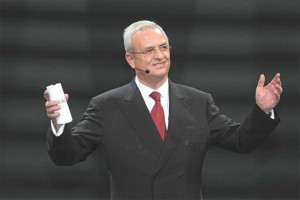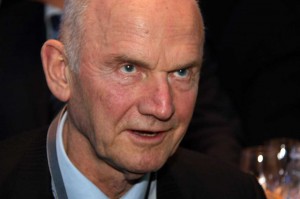
VW CEO Martin Winterkorn may face another round of fighting with Ferdinand Piech, who try to get him fired earlier this year.
Having survived an epic boardroom struggle for power last spring, Martin Winterkorn, VW’s chief executive officer, faces a powerful new challenge to his grip on the automotive giant: the diesel emission scandal that could cost the German maker billions of dollars.
“I, personally, am deeply sorry that we have broken the trust of our customers and the public,” Winterkorn said.
After apologizing, he admitted that engineers developed software purposely designed to defeat emission tests in the U.S. The new controversy may give his former boardroom adversary, Ferdinand Piech, a reason to return.
After his battle with Winterkorn, Piech resigned. While he quit, he has never been reconciled to the defeat, according to some accounts in the German press. The emissions scandal, which is only a few days old, has crippled Volkswagen’s business in the U.S. and exposed the company to huge liabilities, could prompt Piech to renew his calls for Winterkorn’s ouster.

Ferdinand Piech, grandson of the company's founder, resigned as chairman last spring due to a dispute over his successor.
However, CEO’s fate now could rest with the representative of the German state of Lower Saxony, a major VW shareholder, and the union representatives, who control half the seat on company’s board of supervisors, which is responsible for hiring and firing the company’s CEO under German rules.
(VW Passat makes awkwardly timed debut. For more, Click Here.)
Lower Saxony and the IG Metal, the influential German metalworkers union, sided with Winterkorn in the showdown with the Piech, a long-time VW CEO and chairman and grandson of the company’s founder.
In addition, the value of VW’s shares dropped nearly 18% after U.S. regulators found that some of its cars could manipulate official emissions tests. The destruction of shareholder value is certain to alarm members of VW’s board of supervisors and the Porsche/Piech family, which still has a large stake in the company.
Winterkorn has been successful in remaking the VW Group into a one of the world’s top three automakers in recent years with a stated goal of being the world’s top seller by 2018. VW actually outsold Toyota, the world’s top automaker, during the first half of this year, despite weakness in China, the German automaker’s single largest automaker.
The CEO has already issued an extensive and extended personal apology for the emission defeat test scheme, which was uncovered by a consumer advocacy group, which asked for a more complete review of the German automaker’s test results by the U.S. Environmental Protection Agency.
He also acknowledged the company was complicit in manipulating the test results using the software that allowed the diesels to run clean until the testing was complete. The software then switch to a less efficient setting, but provided more power.
(Click Here for details about what is only the beginning of problems for VW.)
Winterkorn said he was asking for an investigation of the company by the German Ministry of Transport. VW has already announced that it plans to recall approximately 500,000 Volkswagen and Audi models in the U.S.
It also facing substantial fines in the U.S. Within the past years the U.S. government has levied a $1.2 billion fine against Toyota for safety defects and last week fined General Motors $900 million for criminal misconduct related to a faulty ignition switch. In addition, Hyundai was fined $300 million for making phony mileage claims.
VW’s misconduct is considered worse, in many ways, because it sought to mislead regulators and evade a regulation critical to public health. VW’s fines could total $18 billion under U.S. law. The actual fine, however, is expected to be smaller. The Environmental Protection Agency found that software in several diesel cars could deceive regulators.
Still waiting to pounce is the California Air Resources Board, which has no use for diesel engine in light-duty vehicles, and could use the scandal to bolster its long-range policy objective of promoting the use of electric vehicles. The oil industry earlier this month helped defeat a legislative proposal that would have forced reductions in the use of vehicles fueled by petroleum products.
(U.S. Justice Dept. opening investigation into VW diesel cheating scandal. Click Here for the latest.)
The VW emissions scandal, however, could revive the legislation, which Gov. Jerry Brown has promised to sign into law and is specifically designed as a measure to slow climate change.

Too late he resigned 9-23-15. See the latest news stories for more details.
Already updated here, Jorge…